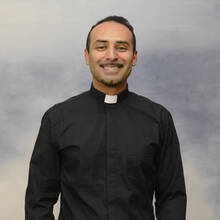An Easter Gift of Friendship With God: Conversion
The trajectory of Peter’s lifelong conversion, as he follows the mission entrusted to him, is a constant reminder of the gift of God’s self-revelation to all peoples. This desire becomes evident in today’s first reading from the Acts of the Apostles.
In truth, I see that God shows no partiality. (Acts 10:34)
Who is “the other” that God has invited you to love in word and deed?
Are you able to spend quiet time in the presence of Jesus as a friend?
Where are you most challenged by the commandment to love one another?
On the Sixth Sunday of Easter, Peter finds himself in a situation. Peter is not unaware that God’s mandate to “bring salvation to all” actually means “all,” Gentiles and Jews alike. But the customs of dissimilar people are so different that even Peter hesitated to share a meal with individuals who did not observe Jewish dietary laws. Acts 10:9-16 details a specific vision that prepares Peter to be open to the idea of a shared meal with people who do not fully share his beliefs and practices. That is a point of tension both at the time of the Apostles and for people today. Not much has changed in that respect.
In this Sunday’s first reading, as Peter begins to see an opening of grace towards non-practicing Jews, he reasons, “In truth, I see that God shows no partiality. Rather, in every nation whoever fears him and acts uprightly is acceptable to him” (Acts 10:34-35). The two conditions in this apostle’s reasoning reveal the prerequisites for grace, which are reverence towards God and just actions in all affairs. This opens up a horizon of salvation for all humanity. As Luke describes this narrative scene, he provides a confirmation from the Spirit for Peter’s assessment. “While Peter was still speaking these things, the holy Spirit fell upon all who were listening to the word” (Acts 10:44). The passage reminds us how shocked the “circumcised believers” were at the outpouring of the holy Spirit upon all the non-circumcised in the room.
Peter is overwhelmed by the evidence of the profound changes that have been confirmed through the Spirit. He responds and baptizes all who ask, without any conditions like circumcision or dietary restrictions. Peter is learning to love those who are different from him. They might even become friends. “They invited him to stay for a few days” (10:49).
The language of love and friendship continues in this Sunday’s Gospel passage from John. A key theme is Jesus’ insistence that his disciples are his friends if they remain in his love. “Remain in my love… no one has greater love than this, to lay down one’s life for one’s friends” (15:9, 13). There is a cost, however. For Jesus, in this final speech before his death, he is leaving his friends so that they may take ownership of his mission themselves. He leaves them a roadmap to follow after he is gone. This last bit of advice offered twice in today’s passage is the way his disciples can “stay” in his love always. “This I command you: love one another” (Jn 15:17).
Jesus’ last words, to love one another, are central to his eucharistic farewell discourse and are perhaps the hardest commandment to follow. In today’s church, the temptation towards rugged individualism is an easy option. There is a temptation to close in upon our own experience of faith, and to let that narrowness feed a sense of cowardly suspicion of others. This is one source of the polarization that continues to plague the church. Peter’s conversion offers an important insight to the moment we are living. When he discovers God’s love even for Gentiles, Peter learns to love them too, especially those who have walked a very different path. But the Spirit falls on all to remind each of Jesus’ command to love one another. “I have told you this so that my joy may be in you and your joy may be complete” (Jn 15:11).








